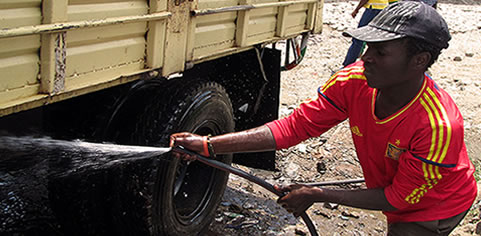Mumbai and Nairobi have acutely unequal urban development, with respectively 40% and 60% of their urban population living in slums. The most impoverished neighbourhoods are characterised by severe lack of service provision and poor access to employment opportunities. Urban violence is deeply rooted in these multiple vulnerabilities experienced by slum-dwellers, yet security provision fails to address violence in this broader context.

Issues of under-policing, unemployment or lack of services that shape urban violence are ultimately intertwined with the difficulty faced by slum-dwellers to interact with state authorities. Formal and informal policies need to take these local realities into account while building on local experience of what works best to reduce vulnerability and minimise violence.
Kenya case study – Nairobi
This case study, which focuses on slum areas in Nairobi, critically assesses existing evidence on aid, state and community efforts to strengthen access to work, economic opportunities and basic services to improve security in poor areas of Nairobi.
While there have been many efforts to strengthen the provision of basic services and provide opportunities for work and enterprise for the urban poor, there is a need to assess how these collectively contribute to the aims of reducing violence and strengthening the security of the urban poor.
The study encompasses:
- a thematic analysis drawing on a range of existing evidence in academic and policy literatures
- key informant interviews in the UK and Nairobi
- focus group discussions in Nairobi
- in-depth qualitative analysis with neighbourhood leaders, activists and representatives of non-state groups providing services and security, based on one poor neighbourhood in Nairobi.
India case study – Maharashtra (including Mumbai)
This case study explores how to move from (short-term) provision of basic services to longer term development that will reduce the likelihood of further violence through more secure livelihoods and employment on the one hand, and by explicitly taking into account violence in development programmes on the other.
The study draws on existing scholarly and policy literatures, and the research team will engage with local communities including the Maharashtra police and other local security forces.